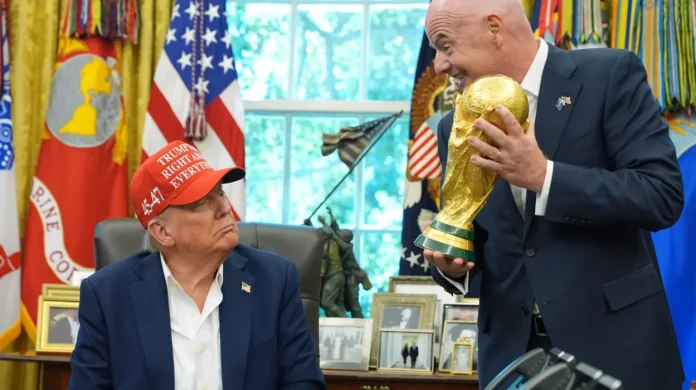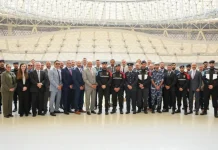The lead up to the 2026 FIFA World Cup, which will occur across the United States, Mexico, and Canada, has been accompanied by not just excitement, but by increasing concerns about the treatment and safety of African fans coming to the United States.
Given there are probably around nine African national teams likely to be in contention under the expanded 48-team format, African viewers make up a large percentage of the total global audience likely to be consumption.
These topics came to the fore in August 2025 with a visit to Kenya by FIFA President Gianni Infantino, where African journalists questioned whether African fans would be safe and treated fairly in the U.S. Infantino was pressed on how FIFA would respond to the rise of racial profiling, immigration prejudice and xenophobia in parts of American political and social discourse.
FIFA’s response falls short of reassurance
In return, Infantino said FIFA is “doing its utmost to make this a global celebration” and cited the 2025 Club World Cup to be hosted in the United States as proof of how the visa process would be seamless for more than 160 countries. However, critics were swift to note the logistical and political scale of a full FIFA World Cup dwarves the Club World Cup, which lasts over a month, features dozens of matches and attracts millions of foreign visitors.
Patrice Motsepe, President of the Confederation of African Football and Vice President of FIFA, also said that further engagement with US authorities will be based around visa access, fan safety and hospitality. Yet even he acknowledged that there are “concerns that remain,” especially in diaspora communities. This has been the view of African football federations and civil society organizations which have called for strong binding commitments as opposed to goodwill.
Lack of structured policy communication
To date, FIFA has not issued any targeted protocols or frameworks to meet the specific needs and vulnerabilities of African supporters of matches in the U.S. There is no publicly available information about how African visitors will be protected from discrimination and profiling during entry at the airport, in public transportation, during police encounters, or in lodging. In a time of recent heated rhetoric and immigration policy debates, such vagueness only serves to fuel skepticism, particularly when placed in the context of recent US immigration policy and rhetoric.
Gaps in FIFA’s planning for fan safety and inclusion
The 2026 tournament will stretch across 11 U.S. cities from Los Angeles to Miami. Cities run at different levels of oversight, coordination, and community-policing standards. This piecemeal approach to governance means that there are risks for visitors to navigate sometimes unfamiliar and inconsistent local systems.
Despite FIFA’s demands to engage with federal and city-level agencies, African advocates say that existing inequalities – including over-policing of Black neighborhoods and housing discrimination, as well as anti-immigrant rhetoric – cannot be mitigated without deliberate planning and open safety policies. The U.S. The State Department has not released any guidance that is specific to World Cup fan engagement or international visitor protections.
Cultural competency and grievance mechanisms
Another big criticism thrown by African organizations is the absence of cultural competency training in the host ecosystem. Ticketing staff, security staff, volunteers, city agencies, etc. are unlikely to have been trained to deal with implicit bias or to respond to complaints from African nationals appropriately. Without access to channels to complain about discrimination or mistreatment-and trust that complaints will be received and addressed-many are concerned about experiencing the same exclusionary dynamics that occurred in prior ways at other international mega-events.
There have been calls for FIFA to institute robust anti-discrimination frameworks, which include helplines for fans and real time intervention mechanisms. However, as of September 2025, these recommendations have not been formalised within FIFA’s planning documents or published information.
Wider implications for FIFA’s credibility and global responsibility
And FIFA’s problem is not about fan logistics; rather, it is about reputation and the general validity of its claims to be a truly global inclusive project. This is not the first instance in which FIFA has been accused of not making the rights and dignity of marginalized communities a priority. From labor issues in Qatar to debates regarding gender equity, FIFA’s history is a patchwork of noble rhetoric and policy reality.
The 2026 World Cup is a new test. African fans are not just spectators; they are the representatives of a continent with a rich football culture and an ever-increasing impact on the global game. Failure to make preparations for their safe and dignified participation can lead to not only reputational blowback but also alienation from an important group of stakeholders for a long time.
He has spoken about this, stressing that the failures of FIFA to maintain the safety and fair treatment of African fans expose deeper systematic issues in sports governance at the global level:
J.D Vance told FIFA World cup fans not to not come to the U.S over stay their Visas therefore these fans and players are saying it’s not safe to have it held in the U.S any longer and they want it changed to another Country because they feel unsafe & threatened by his comments! pic.twitter.com/u2snlLpnF4
— Suzie rizzio (@Suzierizzo1) May 8, 2025
The need for structural reforms
As the event nears, there is increasing pressure on FIFA to act decisively. Civil society organizations and African football associations are demanding a formal roadmap that includes: visa coordination teams to assist African ticket holders, anti-bias training for host city officials, multilingual helplines for incident reporting, and partnership with community groups already active in African diasporas across the U.S.
The absence of such structural safeguards will not only compromise fan safety but also highlight FIFA’s limited influence over host nation practices. The tension between FIFA’s global identity and the localized political environments it operates within has rarely been more visible.
The legacy of the 2026 World Cup will rest not only on goals scored or champions crowned but on whether it lives up to football’s core value: that every fan, regardless of nationality or background, has the right to feel welcome, safe, and equal on the world stage. The next few months will test whether FIFA can meet that standard—or merely repeat the cycle of promises unfulfilled.













